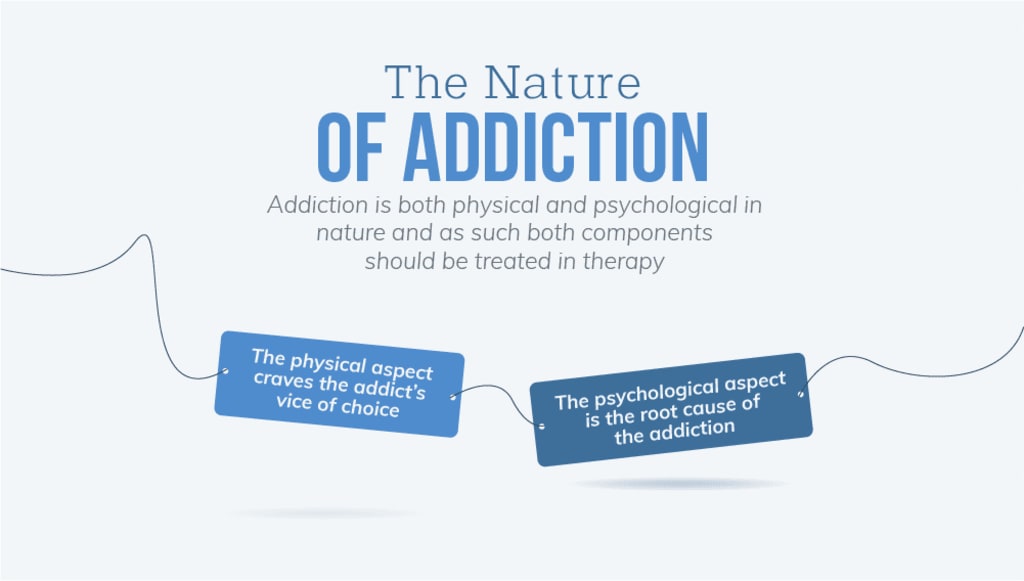The "Choiceless" Choice of Addiction
By Valerie Formicola

All the time addicts hear, why can't you just stop? Why do you choose to live that way? You’re losing everything, how can you not care?
The American Psychiatric Association (APA) has created a manual of all mental disorders DSM is the standard tool for mental health diagnoses, including substance use disorder (SUD). The APA is always updating the DSM and is currently on edition five, DSM-5.
Definition of disease : a condition of living animal or plant body or one of itd parts that impairs normal functioning and is typically manifested by distinguishing signs and symptoms.
In the DSM-5 they have criteria you have to meet in order to be diagnosed.
1. Craving to use substance
2. Wanting to “cut down” or quit but cannot manage too.
3. Building a tolerance to the substance requiring higher doses.
4. Other areas of life becoming neglected because of the substance; work, relationships, family, etc.
5. Using substances even when it puts you in danger of high risk situations.
6. Development of withdrawal symptoms once the substance is gone. The symptoms go away when you take more of the substance.
People say, you know drugs are bad, but you still continue to use them or a similar verse of how simple this process all is. But it’s not. Genetics and upbringing do play a big role in SUD. No person has the same DNA so I wouldn’t expect everyone to act alike. The DSM-5 talks about how some folks are vulnerable because of low levels of self control that predispose them to future problems and lack of coping skills. There has even been research on the correlation between trauma/PTSD and addiction.
The complexity of the brain’s reward system becomes hijacked by the substances. The drugs imitate neurotransmitters that occur naturally in the brain and allows the substance to send abnormal messages to the brain and then the brain to the body. With excessive use, overstimulation of the reward center pathways, there are changes in the brain chemistry which makes it that much more difficult to stop and quit on your own. Addiction is an illogical disease and with that “free choice” is taken from them. Addictions crazy compulsions takes your right away to think clearly and make proper decisions for oneself.
People can battle all they want on the topic of the disease vs choice factor but honestly, if you haven’t lived a life of an addict, you will never truly know the madness is creates. Regardless of someone’s stance or opinion, there is still a huge epidemic out there for substance abuse, especially in times like these when they tell us to isolate.
Addiction is a complex disease that is creating chaos all over the world and we are losing our loved ones at an unbelievable rate.
No one cannot be shamed or guilt into recovery; which could make things even worse. Instead of passing judgements and stigmatizing addicts, know that it is a severe complex mental health issue and needs to be treated as such. There needs to be a treatment plan put into place with health care professionals. There is no need to compare it to other illnesses because no two illnesses are alike. It’s that time to make a shift of thinking and to try and eliminate the awful stigma of addiction and addicts.
With the times being as uncertain as they are, make sure you’re not standing idle. Even if you’re at home you can “travel” the world virtually with AA, NA, and many other meetings. There are virtual meetings all over the world! Though times are hard, we can get through this together.
SAMHSA’s National Helpline (Treatment Referral Routing Service) is a confidential, free, 24-hour-a-day, 365-day-a-year, information service, in English and Spanish, for individuals and family members facing mental health and/or substance use disorders. This service provides referrals to local treatment facilities, support groups, and community-based organizations. Call the National Helpline, SAMHSA’s Treatment Referral and Routing Service, at 1-800-662-HELP (4357).
You will find a bunch of SAMHSA resources at your disposal for mental health!
Stay safe & strong
💜 Valerie
About the Creator
Valerie formicola
Hey Everyone!
Im Valerie, a 30 year old yoga teacher and ex heroin addict and I'm here to share what I know and share my story in hopes to at least reach one person who may be struggling and help them find their way.
Enjoy!
Valerie






Comments
There are no comments for this story
Be the first to respond and start the conversation.